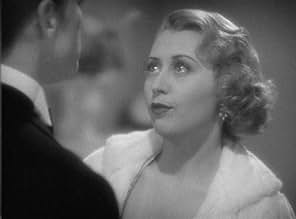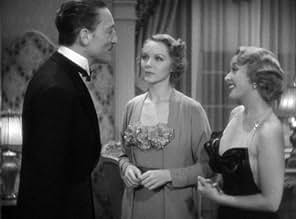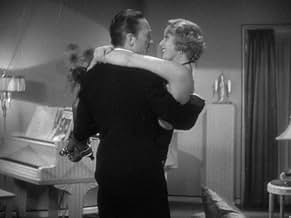Vicki Wallace teases her husband Tony until he hits her. After divorcing and marrying Vernon, her behavior leads to similar results. She returns to Tony's place, where drama unfolds with his... Read allVicki Wallace teases her husband Tony until he hits her. After divorcing and marrying Vernon, her behavior leads to similar results. She returns to Tony's place, where drama unfolds with his date Bonnie and Vernon's friends.Vicki Wallace teases her husband Tony until he hits her. After divorcing and marrying Vernon, her behavior leads to similar results. She returns to Tony's place, where drama unfolds with his date Bonnie and Vernon's friends.
Monica Bannister
- Model
- (uncredited)
Frederick Burton
- Judge
- (uncredited)
Virginia Dabney
- Duryla Model
- (uncredited)
Frank Darien
- Court Spectator
- (uncredited)
Lester Dorr
- Court Recorder
- (uncredited)
Sarah Edwards
- Mrs. Crosby's Mother
- (uncredited)
Bill Elliott
- Nightclub Patron
- (uncredited)
June Glory
- Model
- (uncredited)
Bert Moorhouse
- Court Clerk
- (uncredited)
Dennis O'Keefe
- Nightclub Patron
- (uncredited)
Featured reviews
A bored & beautiful SMARTY enjoys goading both of her husbands into fits of jealous rage.
This very bizarre little comedy from Warner Bros., which sneaked in under the wire before the imposition of the Production Code, actually espouses physical abuse as the secret ingredient needed in keeping the romantic spark alive in marriage. This distressful assertion is promoted by skillful players and smug dialogue, but to no avail.
Joan Blondell, as blonde & curvaceous as ever, is portrayed as an intensely annoying young virago with all the charm of an acid bath. Endlessly nagging, the script gives her one shrill note to play, which she does with unnerving tenacity. In most of her other roles of the period she played a smart & sassy gal who has to fight her way to happiness by final fadeout. Here, Blondell starts with everything and seems determined to claw her way to the bottom again. Must be some sort of mental aberration.
Patrician Warren William & nervous Edward Everett Horton supplied wonderful moments in dozens of Golden Age films. Here, as the two men caught in Blondell's web, although they make valiant efforts, they seem out of place in the rather sordid storyline.
Rounding out the cast as two friends seemingly without meaningful lives of their own, viewers will probably find Frank McHugh to be distressingly simpleminded and pretty Claire Dodd vindictive & catty. Neither exemplify the sort of friend one would want to have during a time of domestic crisis.
Perhaps it would be well to quote a single paragraph from celebrated journalist Harriet Hubbard Ayer's essay `What Not To Do,' published in CORRECT SOCIAL USAGE (The New York Society Of Self-Culture, 1903) `Don't nag; there's nothing in it but hateful thoughts for all concerned, and such thoughts are germs that breed deceit on one side and ungovernable temper on the other. At the end of the road is division of hearts, often a divorce court.' Blondell & Company should have paid heed.
This very bizarre little comedy from Warner Bros., which sneaked in under the wire before the imposition of the Production Code, actually espouses physical abuse as the secret ingredient needed in keeping the romantic spark alive in marriage. This distressful assertion is promoted by skillful players and smug dialogue, but to no avail.
Joan Blondell, as blonde & curvaceous as ever, is portrayed as an intensely annoying young virago with all the charm of an acid bath. Endlessly nagging, the script gives her one shrill note to play, which she does with unnerving tenacity. In most of her other roles of the period she played a smart & sassy gal who has to fight her way to happiness by final fadeout. Here, Blondell starts with everything and seems determined to claw her way to the bottom again. Must be some sort of mental aberration.
Patrician Warren William & nervous Edward Everett Horton supplied wonderful moments in dozens of Golden Age films. Here, as the two men caught in Blondell's web, although they make valiant efforts, they seem out of place in the rather sordid storyline.
Rounding out the cast as two friends seemingly without meaningful lives of their own, viewers will probably find Frank McHugh to be distressingly simpleminded and pretty Claire Dodd vindictive & catty. Neither exemplify the sort of friend one would want to have during a time of domestic crisis.
Perhaps it would be well to quote a single paragraph from celebrated journalist Harriet Hubbard Ayer's essay `What Not To Do,' published in CORRECT SOCIAL USAGE (The New York Society Of Self-Culture, 1903) `Don't nag; there's nothing in it but hateful thoughts for all concerned, and such thoughts are germs that breed deceit on one side and ungovernable temper on the other. At the end of the road is division of hearts, often a divorce court.' Blondell & Company should have paid heed.
Interesting if bizarre dark comedy. This has been well reviewed by others. Two comments. The first is Warren Williams vacillating character, one minute dismissive of his ex-wife, then next expressing his undying love. This is not his most forceful or consistent role. The next is Joan Blondell and her motivation. She divorces her husband one minute and marries another shortly thereafter. Was she trying to make her husband more romantic, or was she living out her masochistic fantasies?
The dimpled Claire Dodd does a good job as the divorced friend of the couple. It was also nice to note Edward Everett Horton toning down his usual effete, fuss-budget persona.
The dimpled Claire Dodd does a good job as the divorced friend of the couple. It was also nice to note Edward Everett Horton toning down his usual effete, fuss-budget persona.
... that being that a husband slapping his wife is actually a turn on for her. Tony Wallace (Warren William) slaps his wife Vicki (Joan Blondell) during a small gathering at their apartment for saying the phrase "diced carrots", which is some kind of marital in joke. Kind of like "Niagara falls" in the old Three Stooges routine. The phrase makes Tony go crazy. Attorney Vernon Thorpe (Edward Everett Horton), who has always loved Vicki, is present at the time and tells her that he can get her a divorce on the grounds of extreme cruelty.
He does, and fast forward and Vicki has married Vernon. But the grass is not greener. Vicki finds herself bored with Vernon's kind and giving ways and decides she wants her first husband back. Complications ensue.
It really pains me to give a movie with the best WB had to offer in comedy in front of the camera in 1934 only a mediocre grade. But the characters are cardboard and the very thin humor wore on me after a very short while. And Blondell is playing one of the most annoying nagging characters in the history of film, although she is playing it tongue in cheek. How I felt about this film was very similar to how I felt about the very first production code comedies because they often substituted shouting and motion for that great precode bite and energy.
He does, and fast forward and Vicki has married Vernon. But the grass is not greener. Vicki finds herself bored with Vernon's kind and giving ways and decides she wants her first husband back. Complications ensue.
It really pains me to give a movie with the best WB had to offer in comedy in front of the camera in 1934 only a mediocre grade. But the characters are cardboard and the very thin humor wore on me after a very short while. And Blondell is playing one of the most annoying nagging characters in the history of film, although she is playing it tongue in cheek. How I felt about this film was very similar to how I felt about the very first production code comedies because they often substituted shouting and motion for that great precode bite and energy.
An early and not very effective entry in that 1930's movie specialty-- the screwball comedy. Some necessary elements are present— ritzy wardrobes, sophisticated dialog, colorful characters. Then too, the plot's appropriate-- a farcical marriage-go-round where no one much cares who's married to whom.
At the same time, catch the sexy Vicky (Blondell) as she endlessly rolls and unrolls her hosiery, that is, when not fitting into backless evening wear or craving a little rough man-handling. In short, it's the kind of provocative material that soon brought down the heavy hand of Hollywood censorship. (Scope out the very last scene that I expect challenged even the loose conventions of the time.)
The women are well cast, including the eye-rolling Blondell, a dryly sensible Claire Dodd, and a sweetly seductive Joan Wheeler. The problem is with the two male leads. Now, I'm a big fan of Warren William who's unequalled in ruthless, authoritative parts, e.g. Employee's Entrance (1933), Skyscraper Souls (1932), which remain true period classics. The trouble is that the role here of the discombobulated husband Tony calls for the light comedy skills of a William Powell, for example; the aristocratic William does try hard, but lacks that particular flair. Also, the naturally comedic Horton is memorable in eccentric parts, but is unfortunately miscast here as a strait-laced, jealous husband.
At the same time, director Florey doesn't manage the kind of zany pacing that could have smoothed over some of the questionable parts. Too much of his deliberate tempo comes across like the stage play the material is adapted from. As a result, the movie has its moments—mainly the super coy Blondell and a provocative parade of 30's fashions—but is otherwise a titillating disappointment.
At the same time, catch the sexy Vicky (Blondell) as she endlessly rolls and unrolls her hosiery, that is, when not fitting into backless evening wear or craving a little rough man-handling. In short, it's the kind of provocative material that soon brought down the heavy hand of Hollywood censorship. (Scope out the very last scene that I expect challenged even the loose conventions of the time.)
The women are well cast, including the eye-rolling Blondell, a dryly sensible Claire Dodd, and a sweetly seductive Joan Wheeler. The problem is with the two male leads. Now, I'm a big fan of Warren William who's unequalled in ruthless, authoritative parts, e.g. Employee's Entrance (1933), Skyscraper Souls (1932), which remain true period classics. The trouble is that the role here of the discombobulated husband Tony calls for the light comedy skills of a William Powell, for example; the aristocratic William does try hard, but lacks that particular flair. Also, the naturally comedic Horton is memorable in eccentric parts, but is unfortunately miscast here as a strait-laced, jealous husband.
At the same time, director Florey doesn't manage the kind of zany pacing that could have smoothed over some of the questionable parts. Too much of his deliberate tempo comes across like the stage play the material is adapted from. As a result, the movie has its moments—mainly the super coy Blondell and a provocative parade of 30's fashions—but is otherwise a titillating disappointment.
This pretty amusing Pre-Code Hollywood divorce farce features an excellent cast and several very funny lines. It treats divorce as simply a part of the mating game, and treats the mating game as just that; it's one cynical movie. The script is certainly nowhere as witty as the first few Thin Man movies, and is actually disturbing if you put it at all within the real context of violence against women - the way the script treats hitting your wife as an element of comedy is downright shocking.
Did you know
- TriviaTony tells Vicki that he's been going to the movies quite a lot recently, and there the women are quite different: "They get pushed in the face with grapefruit and they love it." This is a reference to L'ennemi public (1931) with James Cagney, who famously shoved half a grapefruit into Mae Clarke's face. Joan Blondell also was in that film, so this apparently is an inside joke.
- GoofsAt the 4 minute mark the boom mic shadow moves on the wall by the book shelves.
- Quotes
George Lancaster: Love is the illusion that one woman differs from another.
- ConnectionsReferences L'ennemi public (1931)
- SoundtracksBridal Chorus
(1850) (uncredited)
from "Lohengrin"
aka "Here Comes the Bride"
Music by Richard Wagner
Performed by the Vitaphone Orchestra
Variation played when marriage is announced in gossip column
Everything New on HBO Max in August
Everything New on HBO Max in August
Looking for something different to add to your Watchlist? Take a peek at what movies and TV shows are coming to HBO Max this month.
Details
- Runtime1 hour 5 minutes
- Color
- Sound mix
- Aspect ratio
- 1.37 : 1
Contribute to this page
Suggest an edit or add missing content





































